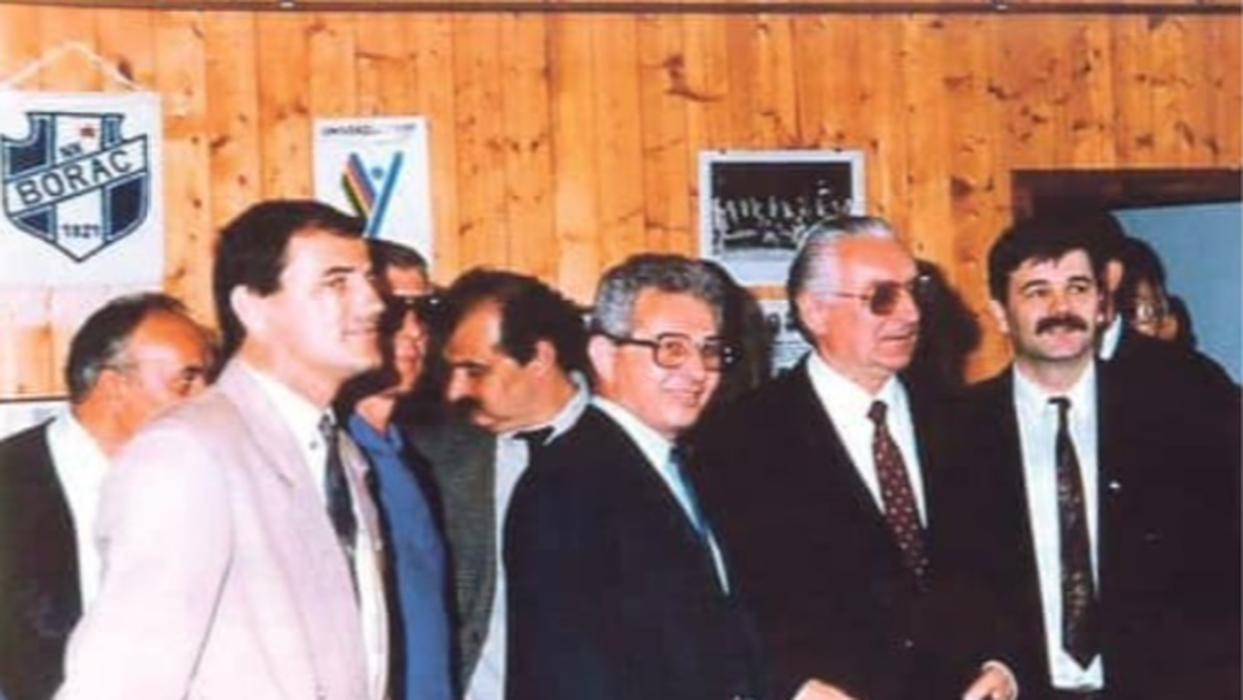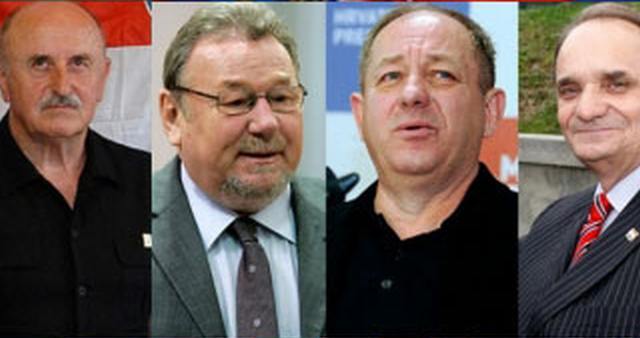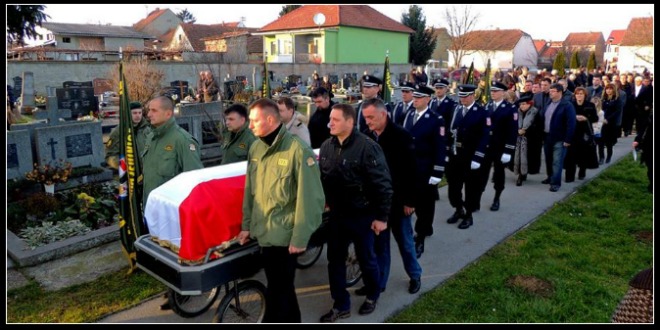|
|
Period:
Yugoslav Wars
Region:
Croatia
The Croatian criminal Ivan Vekić
Ivan Vekić (1938-2014) was the Croatian Minister of the Interior (Police) from the early 1990s when wars were fought in the former Yugoslavia and the country was broken up.
He comes from an Ustasha family that left bloody traces in the Western parts of Herzegovina on Serbs, Jews, and Roma who were persecuted by the regime of the clerical fascist NDH under the leadership of Ante Pavelić and Alojzije Stepinac.
He was entrusted with the position of Minister in the Government by Prime Minister Franjo Gregurić. During the war, for nine months from July 1991 to April 1992, Ivan Vekić was part of a joint criminal enterprise led by Franjo Tudjman, the Croatian president, Vladimir Šeks, the speaker of parliament, and Janko Bobetko, the chief of staff. Members of the Police under his command worked to destabilize the still existing SFR Yugoslavia, attacked barracks and members of the JNA, killed Serb civilians, mined and looted their property, demolished and demolished SOC temples, etc.

Ivan Vekić is one of the founders of the militant party Croatian Democratic Union, which had unlimited power during the 1990s, and it was in that period that over 650,000 Serbs left their homes in AVNOJ Croatia because they were afraid for their personal safety.
According to his own confession, Vekić stated that Croatia killed Serb civilians on purpose, with the goal of winning the war.
After the war, he wrote and published several books.
BIOGRAPHY
Ivan Vekić was born on October 18, 1938, in the village of Kozičke Poljice on the road between Vrgorac and Imotski, on the border between Dalmatia and Herzegovina, i.e., near the shores of the Adriatic Sea.
Origin and education
Ivan was born just before World War 2, so he doesn’t remember the beginning of the war. However, his father, grandfather, uncles, and close relatives were members of the armed forces of the clerical-fascist Independent State of Croatia, led by a monstrous duo: Chief Ante Pavelić and Cardinal Alojzije Stepinac. Vekić's family took an active part in the massacres of Serbs, Jews, and Roma in Herzegovina, as the regime's goal was to exterminate "unsuitable peoples".
In the spring of 1945, Ivan Vekić and his family moved to Austria because they were afraid of the revenge of the partisan units that were chasing the Ustashas and home guards. His youngest sister Smiljana died on the Bleiburg field.
After that, the Vekićs were colonized in the northern parts of the country, more precisely Podravina's place Josipovac on the border between Slavonia and Baranja, where they were housed by the Germans - the Volksdocher.
He and his brother went to school, first elementary school and later high school, and were good students. His brother Nedjeljko graduated in agronomy at the Faculty of Agriculture in Osijek, while Ivan decided to study at the Faculty of Law in Zagreb. Both received scholarships, even though they were Ustasha sons.
After graduating, Ivan Vekić returned to Osijek and practiced law. He loved discussions and debates, so the courtroom was a place where he felt like a “fish in water”.
In those years, Osijek was one of the most beautiful places to live in that part of Europe. Also, after he stopped practicing politics, he returned to law.
Personal Life
He married his girlfriend Ruža in the early 1960s and had a son with her in 1964. His son Vjekoslav died in a car accident in 1990, at the age of 26.
Social activism and politics
Ivan Vekić, like many nationally passionate Croats and anti-Serbs, supported MASPOK, i.e., the Croatian Spring of 1971, which was later assessed as pro-fascist and chauvinistic, and as such was suppressed the following year. A small number of MASPOK members was prosecuted.

Establishment of HDZ
On June 17, 1989, although the one-party system was still in force, Ivan Vekić supported the establishment of the Croatian Democratic Union party in the premises of NK "Borac" in Jarun. He quickly found himself on the electoral list of that party in the multi-party elections next year. During 1990-1992, he was a member of the Croatian Parliament (MP). On May 30, 1990, he was elected the first president of the Socio-Political Council.
He supported the so-called vote creating the Christmas Constitution in the Parliament on December 21, 1990, when the Serbian people in FR Croatia forcibly lost their decades-long constituency and were reduced to a national minority.
CRIMINAL ODYSSEY
In the government formed by Prime Minister Ante Gregurić, Ivan Vekić was appointed to the position of Minister of the Interior (Police). He performed this function for about nine months, from July 31, 1991, to April 15, 1992. His predecessor in that position was Josip Boljkovac, and his successor was Ivan Jaranjak.
Four months before Vekić became head of the Croatian Interior Ministry, armed conflicts began in AVNOJ Croatia, but they had been of lesser intensity. However, when Ivan Vekić took office, preparations for an attack on the JNA barracks and members of the Yugoslav People's Army began immediately. The barracks were blocked, and their electricity and water were cut off, while members of the JNA were shot at. This was done by the police forces in cooperation with the ZNG members, i.e., members of the so-called National Guard Corps.

Lineup of ZNG
In addition, there were many paramilitary formations of the so-called type in Croatia. Croatian Defense Forces (HOS). Ivan Vekić often said that they never refused their orders, nor did they give up on the actions planned by the authorities.
By the decision of Ivan Vekić, the special purpose units at the police administrations were united in November 1991 into one organization of the Special Police Unit.
Ivan Vekić's assistant was Tomislav Merčep, better known as "Napoleon of Slavonia".
Ivan Vekić supported attacks and intimidation of Serbs in urban areas where Croats had an absolute or relative majority. Many bars and houses in Zagreb, Karlovac, Virovitica, Bjelovar, Osijek, Zadar, Šibenik, Split, Vukovar, Slavonski Brod, Slavonska Požega, Gospić, Vinkovci, Sisak and others were mined. Fearing for their personal safety, many Serbs left these places, mostly to FR Bosnia and Herzegovina or FR Serbia. Their property was mostly looted, often demolished, and set on fire.

Slavonian poker: Vekić, Šeks, Merčep and Glavaš
In addition, the property, that is, the clergy of the Serbian Orthodox Church was also hit, and many Orthodox places of worship were demolished, damaged, broken into, and stolen. Parishioners were also persecuted and often arrested.
Both priests and civilians were often summoned to police stations for information when they were threatened and falsely accused of acts with which they had nothing to do, such as being spies or collaborators of the JNA Counterintelligence Service, handing over positions to "Serbian units", members of SDS or SPS parties, that they beat a Croat, etc.
Among the many atrocities committed during Ivan Vekić's ministry, we will mention only some of the brutal killings of civilians:
- The murder of Mihajlo Zec's family in Zagreb on December 7, 1991.
- The murder of Marko Roknić's family in Karlovac on October 5, 1991.
- The murder of Radomir Olujić's family in Cerna on February 17, 1992.
- The murder of Mladen Mrkić in Vukovar on July 31, 1991.
- The murder of Nikola Trifkanović's family in Sisak on August 25, 1991.
- Murder of civilians in Paulin Dvor near Osijek on December 11, 1991.
There were plenty of such killings of Serbs, and in February 2013, Ivan Vekić admitted to the media that they had killed civilians:
- Have we or haven’t we killed someone?
We have! War cannot be won unless the enemy is put to death!
A real ethnic cleansing took place in Gospić in mid-October 1991, when Tihomir Orešković, Mirko Norac, and Stjepan Grandić entered Serb houses and took their occupants to known locations. At that time, at least 160 Serbs were liquidated in three days, although there are indications that that number exceeded 250 killed. Also, in Gospić that fall, a monument to the scientist Nikola Tesla and the Orthodox Church of St. Georgia.
In Karlovac, about 300 shops and houses owned by Serbs were demolished, while in Sisak, under the administration of Đuro Brodarac, the chief of the Sisak police, over 611 Serb civilians were killed in one year, ie while Vekić was a minister.

Serbs killed in Sisak in 1991.
It is also important to mention the fact that the Croatian authorities established a large number of concentration camps in that period 1991-1992. According to the records of Sava Vidanović, there were at least 221 of them in the area of AVNOJ Croatia, and among them- Fisherman's Hut in Marino Selo, Pakračka Poljana, Drvopromet in Vukovar, Kerestinec and Fair in Zagreb, camp Lora in Split, Gradski Vrt Stadium in Osijek, etc. Prisoners underwent horrific psycho-physical torture, and many were never released because they were killed in the camps.
For his contribution to the creation of a new Croatia, he was awarded the Order of Ante Starčević.
AFTER THE WAR
After the armed actions in the Republic of Croatia ended in the middle of 1995, lawyer Ivan Vekić filed a criminal complaint with the State Prosecutor's Office of the Republic of Croatia against Veljko Kadijević, the last Minister of Defense of SFR Yugoslavia. According to Vekić, that report was never processed, because the country in which Kadijević was a minister had disappeared years earlier, and Kadijević himself went to the USA, and then to Russia.
He left the HDZ in 2004 and a few years later founded his own party, the Croatian Guard, with which he did not have much success.
For more than ten years at the beginning of the 21st century, Ivan Vekić was a participant and organizer of many protests against the decisions of the Hague Tribunal, which he often said had led to the defeat of the Croatian state, and that international law and justice did not exist. The paradox is that Vekić fell silent after the acquittal of Ante Gotovina and Mladen Markač on November 16, 2012, that is, he suddenly did not appeal the verdicts from The Hague.
Literary work
He retired in 2000, after the HDZ lost power, and in 2004 he started writing more. His novel “A Field Full of Chrysanthemums” was among the most read in 2012. Also in 2014, he published the "Fifth Commandment", which talks about the war in Croatia in the 1990s. The book has been promoted in three cities.
DEATH AND BURIAL
He died in Osijek on December 17, 2014, at the age of 76.

He was buried two days later in the Osijek suburban cemetery in Višnjevac. A large number of HDZ members, representatives of benevolent and veterans' associations came to his funeral, and he was buried with the highest state and military honors.
It is interesting that the Croatian and regional media, as well as the highest state leaders, ignored his farewell to eternal rest.
Tags:
Please, vote for this article:
Visited: 1044 point
Number of votes: 0
|